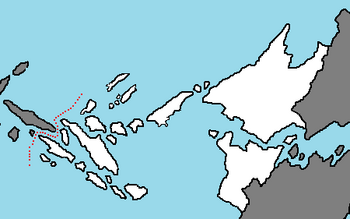Qolaysia: Difference between revisions
No edit summary |
No edit summary |
||
| Line 90: | Line 90: | ||
}} | }} | ||
The '''Federation of Qolaysia''', most commonly known as '''Qolaysia''', is a nation in the [[Coalition of Crown Albatross]] located on the continent of [[Adula]], with maritime borders with [[Ascacia]] and [[Togaria]]. It consists of more than three thousand islands. The sovereign state is a presidential, constitutional federation with an elected legislature. It has 34 provinces, of which five have special status. The country's capital, [[Leonrau]], is the | The '''Federation of Qolaysia''', most commonly known as '''Qolaysia''', is a nation in the [[Coalition of Crown Albatross]] located on the continent of [[Adula]], with maritime borders with [[Ascacia]] and [[Togaria]]. It consists of more than three thousand islands. The sovereign state is a presidential, constitutional federation with an elected legislature. It has 34 provinces, of which five have special status. The country's capital, [[Leonrau]], is the most populous urban area in the country. The country shares land borders with --insert country--. Despite its urban population and densely populated regions, Qolaysia has vast areas of wilderness that support one of the world's highest levels of biodiversity. | ||
The Qolaysian archipelago has been a valuable region for trade since at least the 8th century when the [[Emmiria]]n and later [[Skith]]an Empires traded with entities from mainland [[Adula]] and the subcontinent. Local rulers gradually absorbed foreign influences from the early centuries and Qolaysian kingdoms flourished. Sunni traders and Sufi scholars brought [[wikipedia:Islam|Islam]], while [[Verdusa]]ns and [[Euronia]]ns introduced [[wikipedia:Christianity|Christianity]] through colonisation. Although sometimes interrupted by the [[Quetana]]ns, [[Durnstaal]], and even [[Yuan]]eze, the [[Togaria]]ns were the foremost colonial power for much of their 350-year presence in the archipelago. The concept of "Qolaysia" as a nation-state emerged in the early 20th century and the country proclaimed its independence in 1945. However, it was not until 1949 that the Togarians recognised Qolaysia's sovereignty following an [[Semalia Gulf War|armed and diplomatic conflict]] between the two and the outset of the [[World War (Iearth)|World War]]. In recent years, tensions between Togaria and Qolaysia have escalated over the resource-rich and strategic location of the archipeligo, resulting in numerous clashes including the ongoing [[Togana War]]. | The Qolaysian archipelago has been a valuable region for trade since at least the 8th century when the [[Emmiria]]n and later [[Skith]]an Empires traded with entities from mainland [[Adula]] and the subcontinent. Local rulers gradually absorbed foreign influences from the early centuries and Qolaysian kingdoms flourished. Sunni traders and Sufi scholars brought [[wikipedia:Islam|Islam]], while [[Verdusa]]ns and [[Euronia]]ns introduced [[wikipedia:Christianity|Christianity]] through colonisation. Although sometimes interrupted by the [[Quetana]]ns, [[Durnstaal]], and even [[Yuan]]eze, the [[Togaria]]ns were the foremost colonial power for much of their 350-year presence in the archipelago. The concept of "Qolaysia" as a nation-state emerged in the early 20th century and the country proclaimed its independence in 1945. However, it was not until 1949 that the Togarians recognised Qolaysia's sovereignty following an [[Semalia Gulf War|armed and diplomatic conflict]] between the two and the outset of the [[World War (Iearth)|World War]]. In recent years, tensions between Togaria and Qolaysia have escalated over the resource-rich and strategic location of the archipeligo, resulting in numerous clashes including the ongoing [[Togana War]]. | ||
Revision as of 21:13, 5 October 2020
Federation of Qolaysia Qolaysia | |
|---|---|
|
Flag | |
 | |
| Capital | Leonrau |
| Official languages | Qolaysian |
| Recognised national languages | Togarian |
| Ethnic groups | Jabanesian, Paransian, Togarian |
| Demonym(s) | Qolaysian |
| Government | |
| Abiel Kennard | |
| Population | |
• 2020 estimate | 24,384,000 |
| Date format | mm-dd-yyyy |
The Federation of Qolaysia, most commonly known as Qolaysia, is a nation in the Coalition of Crown Albatross located on the continent of Adula, with maritime borders with Ascacia and Togaria. It consists of more than three thousand islands. The sovereign state is a presidential, constitutional federation with an elected legislature. It has 34 provinces, of which five have special status. The country's capital, Leonrau, is the most populous urban area in the country. The country shares land borders with --insert country--. Despite its urban population and densely populated regions, Qolaysia has vast areas of wilderness that support one of the world's highest levels of biodiversity.
The Qolaysian archipelago has been a valuable region for trade since at least the 8th century when the Emmirian and later Skithan Empires traded with entities from mainland Adula and the subcontinent. Local rulers gradually absorbed foreign influences from the early centuries and Qolaysian kingdoms flourished. Sunni traders and Sufi scholars brought Islam, while Verdusans and Euronians introduced Christianity through colonisation. Although sometimes interrupted by the Quetanans, Durnstaal, and even Yuaneze, the Togarians were the foremost colonial power for much of their 350-year presence in the archipelago. The concept of "Qolaysia" as a nation-state emerged in the early 20th century and the country proclaimed its independence in 1945. However, it was not until 1949 that the Togarians recognised Qolaysia's sovereignty following an armed and diplomatic conflict between the two and the outset of the World War. In recent years, tensions between Togaria and Qolaysia have escalated over the resource-rich and strategic location of the archipeligo, resulting in numerous clashes including the ongoing Togana War.
Qolaysia consists of hundreds of distinct native ethnic and linguistic groups, with the largest one being the Jabanesian. A shared identity has developed with the motto "Bhinneka Tunggal Ika" ("Unity in Diversity" literally, "many, yet one"), defined by a national language, ethnic diversity, religious pluralism within a Muslim-majority population, and a history of colonialism and rebellion against it.

